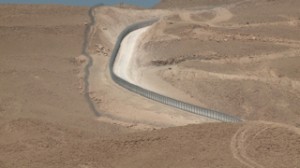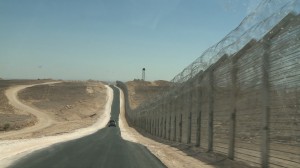
By Marney Blom
Spanning the perimeter of Israel’s southern border, winds a lonely track through the desert wilderness – the borderland between Sinai, Egypt and Israel. Along the road rises a newly constructed five-meter high fence of galvanized steel and mesh, a daunting obstruction for the thousands of illegal infiltrators who trek into Israel through the desert each year. In 2011, 17,000 terrorists, weapons and drug smugglers as well as human traffickers and illegal immigrants entered Israel through this desert route.
“The fence is one of our inventions to prevent terrorist activities against Israel, interference and other criminal activity,” said Brig. General Eran Ophir, head of the joint Defense Ministry-Israel Defense Forces Security fence project, as he guided members of the foreign press to a newly constructed section of the security barrier. ”We think that this fence will stop the terror and the other criminal activities that [are] coming to Israel from this border.”
On June 18, 2012, workers along the security fence came under attack by terrorists who had fired an RPG from the Gaza Strip. One worker was fatality injured. This recent incident coupled by the possibility of a Muslim Brotherhood victory in the recent Egyptian elections raises concern about the security of Israel’s south. Mousab Hassan Yousef, son of Hamas founder Sheikh Hassan Yousef, and author of the autobiography Son of Hamas, understands the concerns first-hand.
“The situation in Gaza and the attempt of the Muslim Brotherhood to dominate the entire region, Israel is going to be their cause,” asserted Yousef. “As long as they can unify people behind the Muslim Brotherhood to fight [the] common enemy they find in Israel, I think that things will keep escalating.”
After Sinai infiltrators killed eight Israelis in August 2011, Israel stepped up its efforts to enclose the entire 230 km perimeter of the Israel-Egypt border with the $72 million barrier, by end of 2013.
Brig. General Bezelel Treiber presented Israel’s plans to the foreign press.
“We [have] changed our point of view about this border. We understand that [it] can’t be any more, [that we] look at this as an open border. We have to be ready for [infiltrators] … and we understand we have to finish the fence as soon as possible.”
With ten million cubic meters of soil already moved – the equivalent of ten million trucks – half the barrier is in place a year ahead of schedule.
But according to Dr. Mordechai Kedar, research associate with the Bar-Ilan University, and academic expert on the Israeli Arab population, there is more to the security equation.

“Without revealing any secrets, Israel has all kinds of weapons which shoot from afar. [It] means they are controlled by remote … and some of these devices are in some places between Israel and Egypt – but not enough.”
In cooperation with Egyptian security forces, and aided by technology, modern-day Israeli watchmen on the newly built walls along the Sinai border have already successfully diminished the number of infiltrators by half. Securing its southern perimeter may not only be in Israel’s best interest, but may be its best first line of defense.
Marney Blom, Acts News Network, Sinai-Israel border
Marney Blom is news director for the Acts News Network.
Copyright © Acts News Network, Inc.
